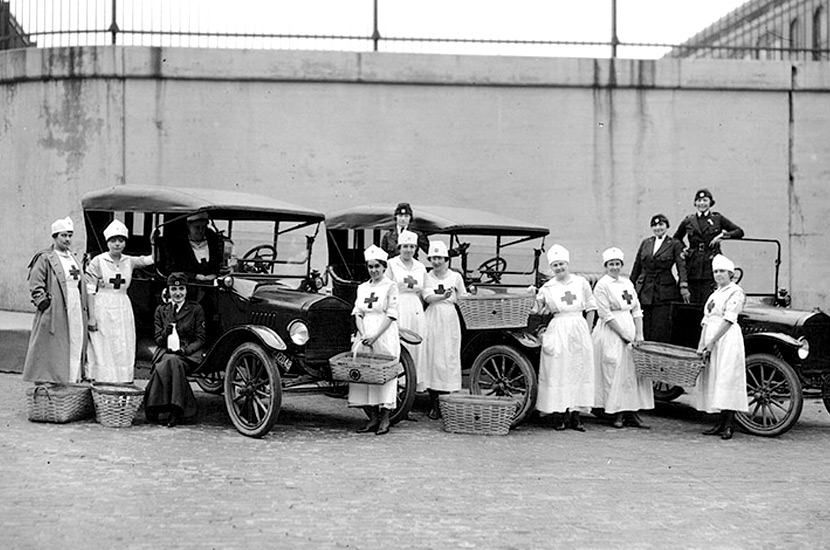
Making a hash of things. An old phrase, it means you take something and cut it into smaller bits. A thing once together is now jumbled and unorganized. Influenza has made all of life an unending hash. The question is left—how do you unhash a hash?
November 15, 1918, Day 70 after influenza broke loose from Fort Devens in Massachusetts.
It’s a make-it-hash day.
St. Paul, Minnesota is opening back up again after weeks of shutdown. They called it “shutdown” but the truth is that a lot of the closure regulations placed on public and private life were ignored, bickered about, or fought over in the capitol city of Minnesota. Today, officials in St. Paul discover that the lowest number of new influenza cases have been reported since the beginning of the outbreak. Good news. Right?
Hold on. Remember it’s make-it-hash day.
As it happens today is also the first day of a labor strike in St. Paul. The telephone operators—mostly women—have refused to show up for work. They’re protesting low wages, bad conditions, ever-heavier loads, and so on. The strain of influenza has them at the breaking point and now they’re taking a stand.
Separately, a likely result of today’s telephone-operator strike is that it’s next to impossible to call your doctor or nurse on the phone. Hence, if you’re sick for the first time with influenza, you can’t let them know. Double-hence, maybe the number of new cases goes down because the phones are dead and city officials are reading the wrong lesson from the wrong data. Hash-day.
You want data. You want to read the data and make a solid decision based on the data. And you really want data-based decisions in moments when people’s lives and livelihoods are at stake. Just about everyone will agree on this, whether out of altruism or self-interest. The problem is hash-day and the difficulty in connecting jagged information to a coherent whole.
The publisher and editors of Variety Magazine have a simple answer on hash-day. Here’s their headline: “Epidemic Wave Has Passed; Entire Country Re-Opening.” Clear. Short. Done. Time to move on into a phase of life forward of the “passing wave.” You unhash by declaring the hash over.
What’s the most remarkable word in this headline?
A good candidate is this: “Entire”. Not just that the temporary condition of influenza has come and gone. No, it’s that all over this sprawling, complex, and multi-layered United States influenza is declared over and done. And don’t forget, the semi-official mouthpiece of a new industry, film-making, has said it is so.
In Indianapolis, Indiana the board of trustees for the local chapter of the American Red Cross have a version of their own hash. They’ve finished and submitted their “Report” today. The Report spans five weeks, from October 10 to today, November 15. The Motor Service Division of the chapter accounts for their work in the five-week span. They organize the span into various categories of tasks and activities, easily readable for people with demands on their time. Most notable is that 48 women who were volunteers spent most of these days driving nurses and supplies throughout the city to cope with influenza. These 48 drivers worked 18-hour days in much of the five weeks covered in the Report.
The Report isn’t brief, like the Variety headline. The Report also isn’t mired in a local dispute, like the St. Paul strike and data. Instead, the Report looks back on the recent past, tries to organize it into understandable slices of information, and wraps it in a tone of appreciation and gratitude for a job well done.
The Report has a spirit. Though unwritten, the spirit is almost as tangible as office typewriter that banged out the words on the paper. It is that, somehow, we sense the worst is, in fact, past. Together a kind of pause in breath, a turning of the corner, and the Report punctuates a closing and a beginning. More of a rehash than an unhash, the Report looks back and pulls the bits and pieces into recognizable shapes. Knowing a little more about what went on might help in knowing a little more about what can happen next.
Influenza has made a hash of things and torn life into pieces. On Day 70 people are trying to put the pieces back together, to unhash, dehash, and rehash.
A thought for you on Day 70, May 21, 2020, seventy days after President Trump declares Covid-19 a national emergency—an old word like hash. I suppose the word “hash” is a generational marker. Today’s generation might think of hashtag. An earlier one might think of drugs. Me, being born an old-timer, I think of it in the original sense as “messing things up.” If we stick with my bias and go with the original meaning, influenza in 1918 and coronavirus in 2020 has certainly made a hash or mess of things in our daily lives. Torn to shreds, sliced to bits, and smashed to smithereens, the world we’ve known has felt largely gone in recent weeks. It won’t last forever and isn’t lasting forever, which means that patching up needs to be done. The patching will require a lot of you as a leader. Day 70 shows us the wisdom of being cautious with data and, more so, your use of data. Don’t take it all at face value. Be willing to ask questions that will challenge and clarify. Don’t swallow it whole and yet don’t dismiss or reject it at every turn. You must be nimble in the data fields. We’ve seen three examples from Day 70—first, where a city seizes on a trend possibly built on shaky ground; second, a publication glances quickly and makes a sweeping conclusion; and third, a local administrative group takes stock of itself to regain a sense of control. These are three different mindsets for operating as a leader and three different uses of data. I’d like you to think about which of these fits closest to you right now and, also, to decide if your use of data is pushing you into one of these three environments. Make your hashday a useful one.

(note to reader—I invite you to subscribe to this series/blog. The purpose of my posting in this series is the purpose of my enterprise at Historical Solutions—to explore the past in a new way that brings new and different value to you, both in the present (this minute) and on the edge of the future (what’s ahead or forward of this minute). The past is everything before now, the totality of all time before the present; history is a set of very small slices of the past that, for a particular reason, have been remembered. If you wish to contact me privately, please do not hesitate to text or call 317-407-3687)







